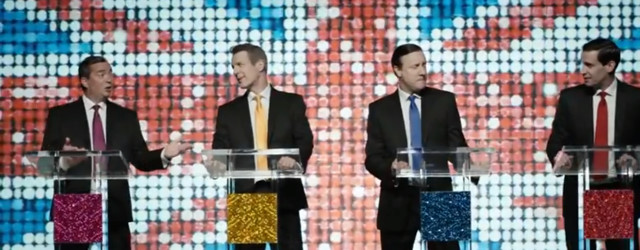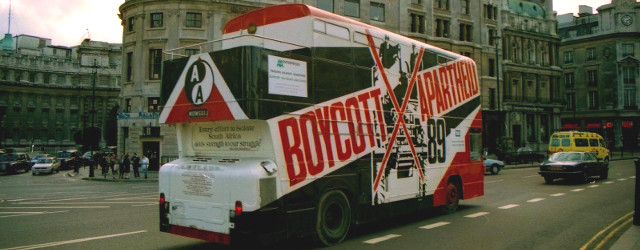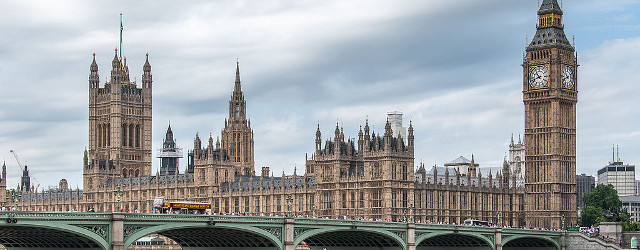Er…
Is it time to boycott political intolerance?
The long debate over what exactly freedom is reached a head last week as various American states wrestled with rehashes of the Religious Freedom Restoration Act. The bill – signed into federal law by US president Bill Clinton in 1993 – seeks to stop government forcing the religious to disobey their own principles, and has lately been mooted in state form in Indiana and Arkansas.
Such legislation seeks to mediate between individual conscience and “compelling government interest”, most notably over the issue of religiously-inspired discrimination. Handily for the media, a prime example of this emerged in the form of Memories Pizza, whose owner Crystal O’Connor said she would not serve a gay couple’s wedding due to her Christian beliefs when asked about the bill.
The backlash against O’Connor and her husband was swift, with the listing for the pizza joint on reviews site Yelp pelted with negative reviews and lewd images. The website of Memories Pizza was also seemingly defaced, and a charming (and presumably, in US parlance, liberal) high school sports coach took to Twitter to threaten the couple with arson.
This is some turnaround for a country that only struck down its prohibitions against sodomy in 2003. As the orthodoxy of homophobia has eroded in the West campaigners have gradually replaced it with a new one, criminalising the expression of old prejudices. Hate speech laws have spread over much of Europe, with countries such as France, Germany and Austria even outlawing the denial of the Holocaust.
The current furore also follows shortly after the defenestration of Brendan Eich, whose brief role as chief executive of the Firefox creator Mozilla was brought to an end last April after acolytes of the nonprofit discovered he had donated money in support of Proposition 8, a law blocking gay marriage in California.
Eich’s politics were no doubt unsuitable for his role at the open source firm, which prides itself on inclusivity. Yet the threats to boycott Mozilla in the wake of his appointment point to a far uglier trend in progressive politics: that of threatening a person’s livelihood when you find their beliefs repugnant.
In the case of Memories Pizza it was not enough for people merely to protest or boycott a malign policy: the business had to be shut down or forced to comply through the law. Such a case has been mirrored in the UK, with the No More Page 3 campaign against the Sun newspaper’s snaps of naked ladies seeing supermarkets obscure the tabloids in their displays.
When taken together such events show the desire for ideological conformity remains alive despite decades of rebellion from the greyness of the post-war years. So long as people exist there will always be puritans on the Left and Right who cannot tolerate any dissent from their viewpoint, and will punish those who openly express such things.
Unsurprisingly such progressive illiberalism has grown as such measures become unnecessary. Even in famously prudish America firms as big as Apple, General Electric and US retailer Walmart rushed to slate the Religious Freedom Restoration Act, realising that the progressive markets are increasingly more lucrative than conservative ones.
That is not to say, as UK Independence Party leader Nigel Farage recently recommended, that we rub out the anti-discrimination laws. But it is worth asking what sort of democracy we are creating if any dissent from orthodoxy is punished through boycotts and threats. It is also worth asking if such shrieking changes the minds of people, or merely pushes their complaints underground, where they fester and grow more noxious.
Image – Daniel Ramirez
How Left and Right posture on health tourism
Politicians in Britain are fond of talking about “tough decisions”. Even on the Left, which is supposed to be the more generous wing, the Labour leader Ed Miliband was happy enough to declare his willingness to tackle “difficult” ones at the leaders’ debate on Thursday.
Why then, was there such a furore over Ukip leader Nigel Farage’s comments over health tourism? Having prefaced his view with the disclaimer that people would be “mortified” that he dare talk about it, Farage said:
“You can come to Britain from anywhere in the world and get diagnosed with HIV and get the retroviral drugs that cost up to £25,000 per year per patient. I know there are some horrible things happening in many parts of the world, but what we need to is put the National Health Service there for British people and families who in many cases have paid into this system for decades.”
A predictable backlash followed, with outrage on Twitter and attacks from the other panellists. At the time Nicola Sturgeon, leader of the Scottish National Party, said: “When someone is diagnosed with a dreadful illness, my instinct is to view them as a human being not consider what country they come from.”
This sounds nice, but it is hard to believe that any of the panel (bar Green leader Natalie Bennett) truly believe in not discriminating against foreigners when it comes to the health service. The alternative would mean offering free health care to all 7 billion people living in the world, which even the Greens would recognise as a bit ambitious.
That doesn’t mean that Farage’s interest in health tourism is not misjudged. In a country open to foreign travel and trade some health tourism is inevitable, or at least would be costly enough to clamp down on that it was not worth the bother. The figures he quoted in regards to HIV (7,000 diagnoses a year, 60% of them accounted for by foreigners) amount to a piffling addition to the health service bill, and the total cost of health tourism is equally piffling.
According to Farage the total cost of health tourism £2bn, a figure that is based on this research commissioned by the coalition. As George Eaton of the (leftwing) New Statesman pointed out at the time, this is not really true:
The £2bn figure refers to the total cost of treating foreign visitors and temporary migrants (such as students and seasonal workers), many of whom are eligible for free treatment and pay tax, not “health tourists”.
The report actually estimates the cost of health tourism at £70m. In the fiscal year 2013/14 the total bill for the NHS was £109.721bn, according to the NHS Confederation, a trade body.
In the end the controversy over Farage’s comment shows both sides posturing. The Left does not really believe that Britain should pay for the world’s healthcare, and the Right are not so bloody minded that they will pursue fraud at any cost.
If the truths about race are being said, how many are listening?
Things We Won’t Say About Race That Are True says obvious things to anyone outside the progressive bubble, cataloguing an ideology drunk on its own dogma.
Osborne’s budget lands on old Tory-Labour divisions
In the age of the Twittersphere it is easier than ever for political pundits to get carried away with the brouhaha of a good session in the Commons, especially when the chancellor George Osborne is delivering his final budget before one of the most precarious elections in living memory.
This is, of course, the kind of event that many of the public loath, seeing it as a charade in which two gangs of public schoolboys (and girls) sneer and holler as one of their number attempts to make a speech about some subject.
For those who like their politics pugilistic the sparring between Osborne and leader of the opposition Ed Miliband will no doubt have entertained. But the temptation to linger on the exact performance of both characters ignores the fact that it is not the acting they will be graded on, but rather the story they convey.
From the chancellor’s view this was an attempt to make light of what has been a difficult recovery – spurred on or delayed by his austerity packages over the last parliament depending on your political opinions. In short, the growth of GDP (gross domestic product) has been good, employment has risen (if not the most secure kind, as Miliband pointed out) and some inroads have been made into cutting back the deficit, and perhaps one day the debt.
Added to this was the obligatory distribution of goodies that included a modest increase in the personal allowance (the bit of your salary you are not taxed on) to £11,000, and a rise in the threshold on the 40 percent income tax band to £43,300, both to be put in place by 2017-18. These will also rise to £12,500 and £50,000 respectively at an undisclosed date.
There was also an intriguing proposal for a new type of ISA (individual savings account) directed towards first-time house-buyers, more mutterings about the so-called “Google Tax” to address the naughty habits of multinationals, a support package for North Sea oil worth £1.3bn and other plans for investment in Osborne’s much vaunted (and derided) “Northern Powerhouse”.
Most surprisingly the chancellor promised not another five years of austerity should a Tory-led government be in charge after May, but a mere four. As he put it: “public spending will grow in line with the growth of the economy”. His claim is that this would bring state spending as a share of the national income in line with the equivalent British figures from 2000, some distance from the comparisons to the 1930s his Autumn Statement invited.
But despite that twist, and various attempts to rebalance the economy away from the South East, the direction of travel for Osborne appears to be much unchanged: a push further into the Thatcherite notion of personal responsibility. Miliband declare it “a budget people won’t believe from a government that’s not on their side”, pointing out the lack of comment around the NHS as proof of the old Tory duplicity over public services and contempt for the poor.
Which of these views the public find most appealing will only show in the coming weeks. But at least for now the dying days of the parliament appear much like the rest of David Cameron’s ministry: a contest between blue and red in who can fail the least effectively.
Image – Daniel Bron



